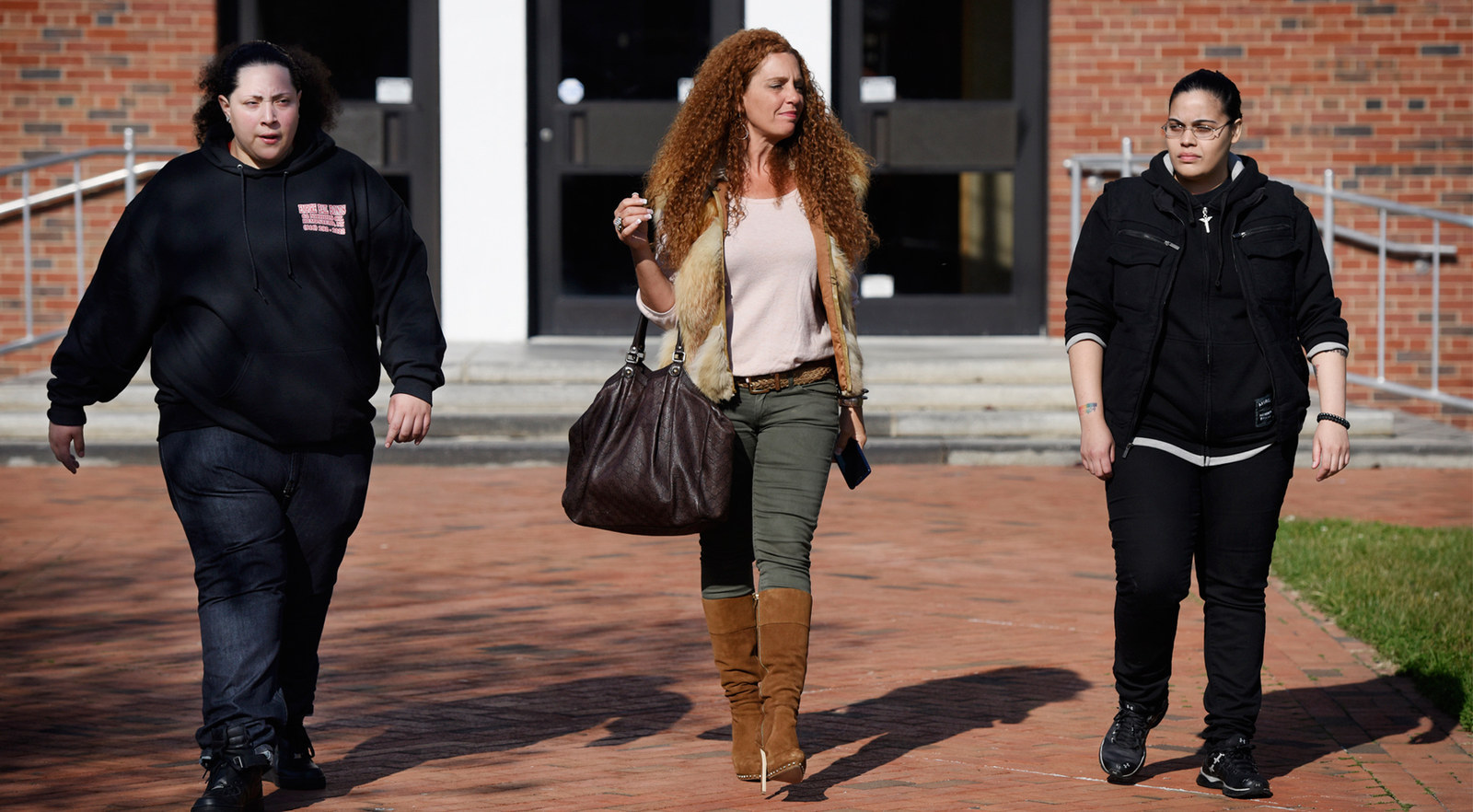Wearing high-heeled boots and flanked by two bodyguards, Michelle Esquenazi strode into the classroom and took a seat in front of 30 or so sleepy teenagers. It was a cloudless morning in November, and the owner and president of Empire Bail Bonds was invited to speak at Wellington C. Mepham, a public high school in Bellmore, Long Island. Her subject was supposed to be the criminal justice system, but she seemed more interested in scaring the kids straight.
“The majority of bail bond consumers are moms and dads and aunts bailing out first-time offenders,” she began. “The faces of the people I bail out today look a lot like yours.”
What followed was a primer on private bail bonding — the controversial industry that lifted Esquenazi and her family from poverty and that, depending on whom you ask, is either an example of the liberties afforded to people in the American criminal justice system or a clear manifestation of its inequalities.
If you are arrested on suspicion of having committed a crime in the U.S., you will be brought to an arraignment court, before a judge. If the charges against you aren't very serious and you're not a flight risk, the judge will let you go on a promise that you will return for your court dates. More likely, the judge will ask you to give the court money as a guarantee that you won’t flee.
This guarantee is called bail. If you make every court date, you will get your money back at the end of your trial, even if you are found guilty. If you run away or miss an appointment, you will lose your money and a warrant will be issued for your arrest.
But let’s say that you don’t have enough money to post bail, and that your family and friends are unwilling or unable to help you. You could opt to spend the duration of your trial in jail, but most of America’s courts are so overloaded that you could easily spend years behind bars. And, if you are to believe Esquenazi, you really don’t want to do that.
“Once you’ve been incarcerated, you realize how good it is to have a bowl of Froot Loops when you want it,” Esquenazi told the suburban teens. “Do you know what would happen to any of you if you ended up in jail? The guys there would say, ‘Look at this little adorable white boy!’ And then, whether or not you enjoy engaging in homosexual activity, you will find yourself fully engaged in it.”
Bail agents such as Esquenazi can help you avoid that outcome by writing you a surety bond. These bonds are a kind of insurance in which a private company promises the court it will pay your bail if you go missing. The agent will charge you a nonrefundable fee for this service.
If you skip out on court, your agent will hunt you down and bring you back to the judge. If the agent succeeds, the bail bond company won’t have to pay your bail. This system, codified by the Supreme Court in the 19th century, means agents go to incredible lengths — sometimes skirting the edges of legality — to make sure you keep up your end of the bargain.
The result is a hybrid industry: half insurance company, half privatized law enforcement.
“In my world, you are not special,” Esquenazi said in her concluding remarks to the students. “You are not some beautiful snowflake. I insure your appearance in court for the good people of the proud state of New York. That means that, for me, you are walking money. I own your body.”
Empire Bail Bonds, Esquenazi’s company, is one of the largest for-profit bail agencies in New York state. The firm has offices in Brooklyn, Staten Island, Queens, and Long Island. By her own telling, she serves “hundreds of thousands” of clients, writing tens of millions of dollars in bonds every year.
Esquenazi and some of her colleagues said their industry levels the playing field of criminal justice. It gives poor defendants the same benefit as rich ones: freedom during trial. It saves taxpayer money that would otherwise go toward jailing costs. By sending bounty hunters after fugitives, they argued, the industry helps overburdened police departments ease their workload.
“Bail bonding is the only part of the criminal justice system that does not cost taxpayers any money,” Dennis Sew, a vice president for Professional Bail Agents of the United States (PBUS), told BuzzFeed News.
But recently there’s been a renewed pushback on that narrative, especially as people take to the streets worldwide to protest abuses in criminal justice.
Critics have called the bail bond industry predatory, a system where headhunters unaccountably exploit lower-income people and minorities. Its stubborn survival in the U.S. — the Philippines is the only other nation that permits it — rests on a paradoxical, and deeply American, concept of freedom: an irrevocable right that can nonetheless be bought and sold.
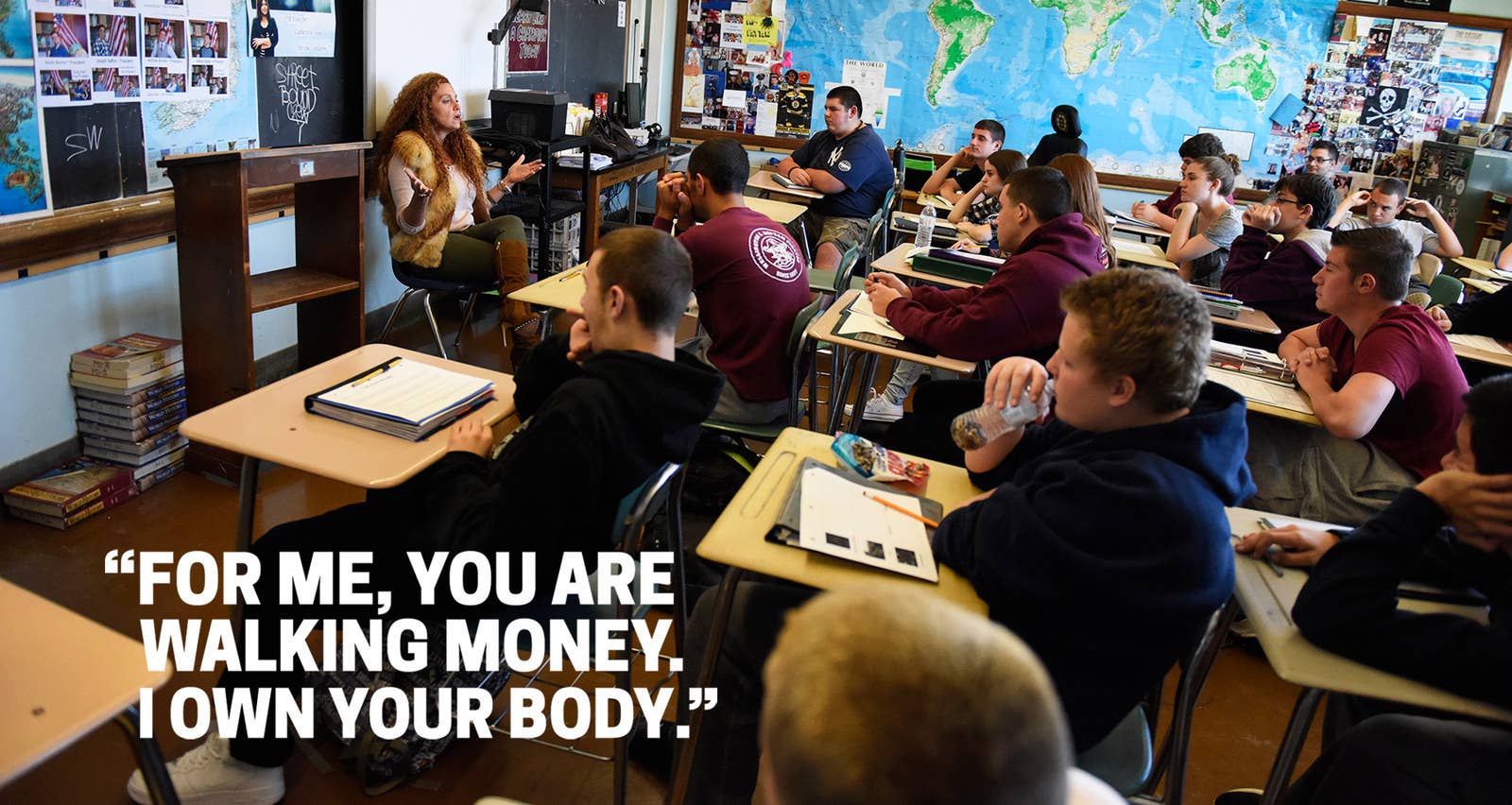
Esquenazi’s got stories, and she’ll tell them to anyone willing to listen. Take Long Island scammers Raymond and Jonathan Roth, a father-son duo charged with faking the dad’s death in order to cash in on a $410,000 life insurance policy. In 2013, Esquenazi put up bail for Jonathan, but he fled the state. She tracked him to Ohio and got him to open the door of his hideout for a beautiful brunette, her decoy.
“Of course he’s going to open up his door for a nice piece of ass, it’s timeless,” Esquenazi crowed to the New York Post at the time.
Or take the case of Michael Mastromarino, also known as the Demon Dentist of Bensonhurst, or, as Esquenazi called him, “the Brooklyn Bone Snatcher.”
Mastromarino was a dentist charged in 2006 with illegally harvesting bone tissue and internal organs from dozens of human cadavers. Operating from a secret room in a Brooklyn morgue, he replaced stolen bones with PVC pipes so mourners wouldn’t notice anything was missing. He sold the body parts, some of which belonged to people with HIV or cancer, to patients in need of transplants. He made more than $4 million from the racket.
After Mastromarino’s arrest, the judge set bail at $1.5 million. The dentist was briefly sent to the notorious Rikers Island jail before his attorneys turned to Empire Bail Bonds.
Esquenazi’s first concern was motivating Mastromarino to remain in the U.S. He had stashed significant assets in the Bahamas, she said. So when the Bone Snatcher walked out of Rikers, a free man on bail, Esquenazi sent a guy to meet him with a brown paper bag.
“You know what was in the bag?” Esquenazi asked one fall morning in her downtown Brooklyn office. “A bologna sandwich and a little carton of milk. You know why? ‘Cause that’s the lunch they give you at Rikers. We wanted him to remember where he’d come from, and where he’d be going back to if he didn’t behave.”
The day after, one of Esquenazi’s menacing employees showed up at Mastromarino’s house at 5 a.m. carrying a tray of freshly baked bagels — a gift so friendly it was threatening. The lesson: Doesn’t freedom taste great? Don’t mess it up.
According to Mastromarino’s attorney, Mario Gallucci, the dentist's wife grew so intimidated that the Bone Snatcher ate his $90,000 fee to Esquenazi and paid another agency to take over the bond.
The new agency rearrested Mastromarino after he showed up 20 minutes late to an appointment, and he spent the rest of his trial behind bars. He was found guilty and sentenced to 58 years in prison. He died in lockup, in 2013, of bone cancer.
Esquenazi basks in her ability to intimidate the Bone Snatcher. She sees it as a shrewd business move — if he had fled, she might have been out millions of dollars.
“That guy was fucked up,” she said. “I may live among ratones, but I can always smell a rat.”
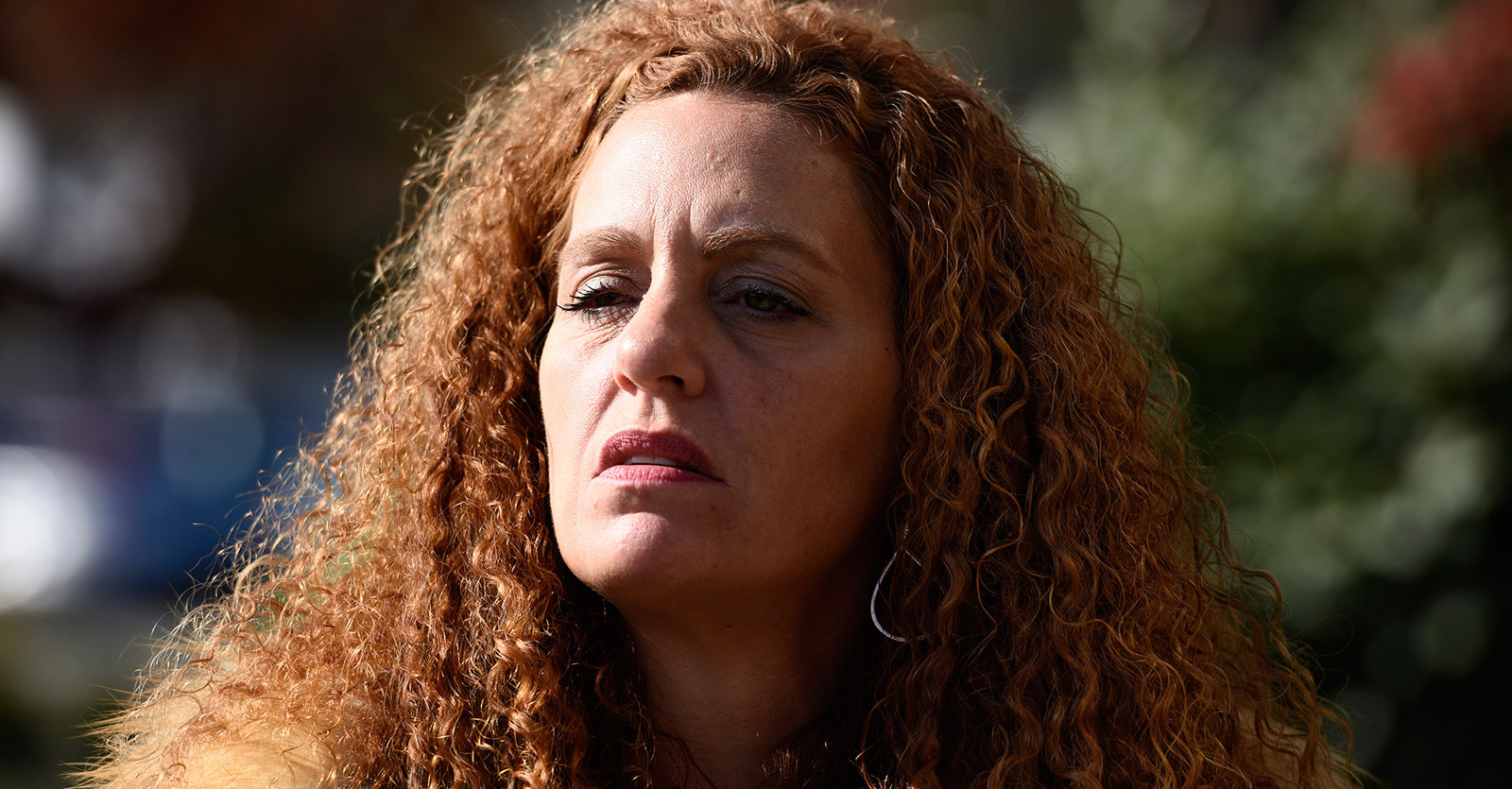
Mastromarino’s story may be the kind of yarn Esquenazi likes to spin, but, unlike him, most bail consumers tend to be poor. According to the nonprofit Pretrial Justice Institute, 53% of those accused of felonies nationwide are unable to post bail on their own. The numbers are worse for the poorest defendants. As the Village Voice reported, 40% of bail offers made in New York in 2010 were worth less than $1,000 — but only 17% of defendants offered such bails could meet the cost.
The result is a large population in desperate need of financial assistance and left at the mercy of an industry that the nonprofit Justice Policy Institute called “systemically prone to corruption, criminal collusion, and the use of coercion against bonded people.”
Industry insiders said a small number of “bad actors” give bail bonding an unfairly negative reputation. Asked for an example, Esquenazi pointed to George Zouvelos, a Brooklyn bondsman who lost his license last year.
According to the New York Department of Financial Services, the agency that oversees bail bonding, Zouvelos operated without a license, took “months or even years” to return money taken from defendants’ families as collateral, and charged his clients outrageous fees for expenses that never happened. The DFS also noted he had been convicted of misdemeanor possession of a shotgun.
(Zouvelos is fighting the suspension in appellate court. He told BuzzFeed News he considers it “unlawful, beyond jurisdiction, and in violation of the constitution.”)
But critics have added that, even if all bond agents were good, there are alternatives to for-profit bail. Pretrial services, as these alternatives are called, are government-funded programs that calculate a defendant’s risk level and then issue a recommendation on whether or not they should be released.
These programs do not take a defendant’s wealth into account, focusing instead on factors such as family ties, employment history, and previous criminal record. Besides assessing whether a defendant is suitable for release, pretrial services programs provide counseling, supervision, and community support. Several studies, conducted as early as 1967, have shown that pretrial services are effective.
So, if pretrial services work so well, why does for-profit bail bonding remain legal in the United States? Some experts told BuzzFeed News that the large insurance companies that underwrite bail agents often make donations to the electoral campaigns of legislators, prosecutors, and judges around the nation.
“They do a lot of lobbying,” said Jon Wool, an expert on pretrial services who directs the New Orleans office of the nonprofit Vera Institute of Justice. “Whenever they feel threatened, they send in opposition research and money and direct local bondsmen on how to defend themselves.”
Whatever the source of the industry’s political capital, the historical trend for bail bonding is toward prosperity. The number and size of bail offers have increased over the past few decades, even as crime rates have fallen across the country.
Statistics from the Department of Justice show that between 1990 and 2009, the number of felony offenders offered bail increased 65%. The DOJ also found that, between 1992 and 2006, the average bail amount nationwide increased by more than $30,000. In 2012, the total value of bail bonds written in the U.S. was $14 billion, according to the PBUS.
Estimating what portion of that sum actually went to bond agents proves difficult, because regulations on the industry vary widely across the country. Most states let bond agents charge fees ranging from 6% to 20% of the total value of the bail. Thirteen states let agencies take whatever cut they want. Illinois, Oregon, Wisconsin, Kentucky, Massachusetts, and Washington, D.C., have outlawed the practice.
What is clear, however, is that there is money — a lot of money — to be made in bail bonds. You only need to be willing to get your hands dirty.
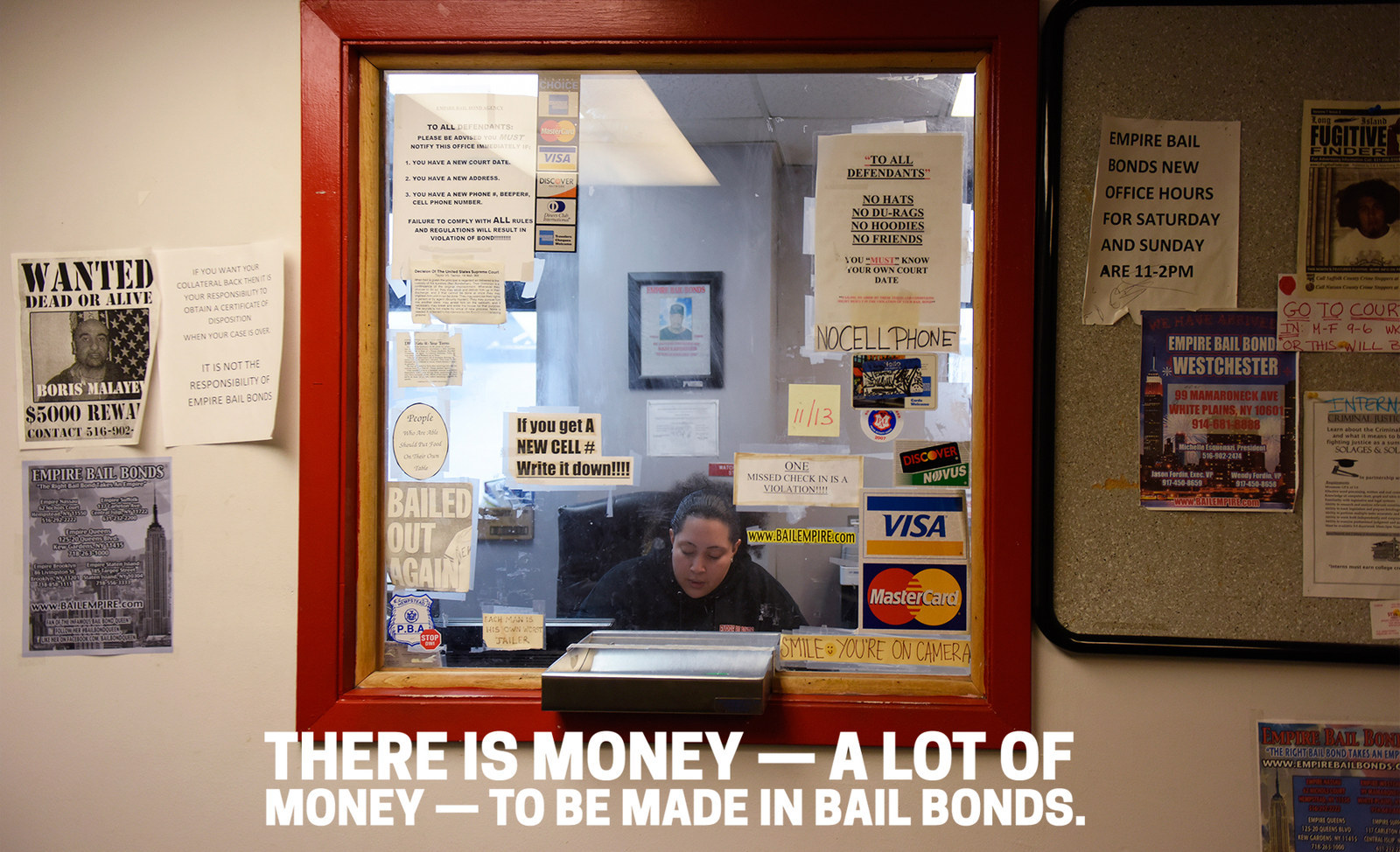
The bail bond industry tends to attract people who didn’t get the education or have the family resources necessary to go into more traditional forms of banking and lending. Esquenazi is no exception.
Her father came to the U.S. from Cuba in the late 1950s, right before Fidel Castro’s revolutionaries marched into Havana. He settled in East New York, Brooklyn, where he married a Polish woman and opened a shoe store with his brothers. Business was good, and the family soon moved to Canarsie, a relatively prosperous neighborhood at the time. Esquenazi’s early years, she said, featured kickball games in one-way streets and Mister Softee trucks parked in front of row house stoops.
But then, as Esquenazi entered adolescence, both New York and her life became turbulent. Crime shot up. The city almost went bankrupt. Esquenazi lost interest in school because, as she put it, she had “places to go and people to see.” Her mother, who had grown up in poverty, was angered by Esquenazi’s delinquency, which she saw as an affront to her hard work. Sometimes, their confrontations became physical.
“It was different back then,” Esquenazi said of her relationship with her mother. “You could beat the shit out of your kids.”
After high school, Esquenazi moved to Miami, where she fell in love with a handsome Cuban immigrant named Jose Luis Santana. They moved in together and lived a carefree life.
“We had nothing but peanut butter and jelly in the fridge, but we were happy,” Esquenazi said. “We would go clubbing at night, go to the beach in the morning, and then go home in the afternoon to sleep.”
That life came to an abrupt end in 1987, when Santana died at age 21. Bereaved and broken, Esquenazi returned to New York and landed in a loveless marriage. Five years later, she was divorced, with three children and on welfare.
Around that time, Esquenazi became close with a distant cousin, a wealthy Turkish woman named Sibel Carlin. A few times a year, Carlin would have Esquenazi and her children over to her apartment overlooking Central Park and let them sift through designer hand-me-downs.
On one of those visits, in 1993, Sibel's husband came home early and ran into Esquenazi. His name was Montgomery Carlin, and although he had started out as an immigration attorney, he had ended up becoming a bondsman.
“I told him I was studying to get my associate degree to be a paralegal,” Esquenazi said. Carlin hired her on the spot. She excelled, and was eventually tasked with opening an office in Hempstead, in Nassau County on Long Island.
But then, around 1994, Carlin began running into problems. He was stealing from colleagues and immigrant clients, according to public records. His business partners repeatedly sued him in civil courts in several states, alleging he owed them millions of dollars. The Department of Financial Services revoked his license in 1999.
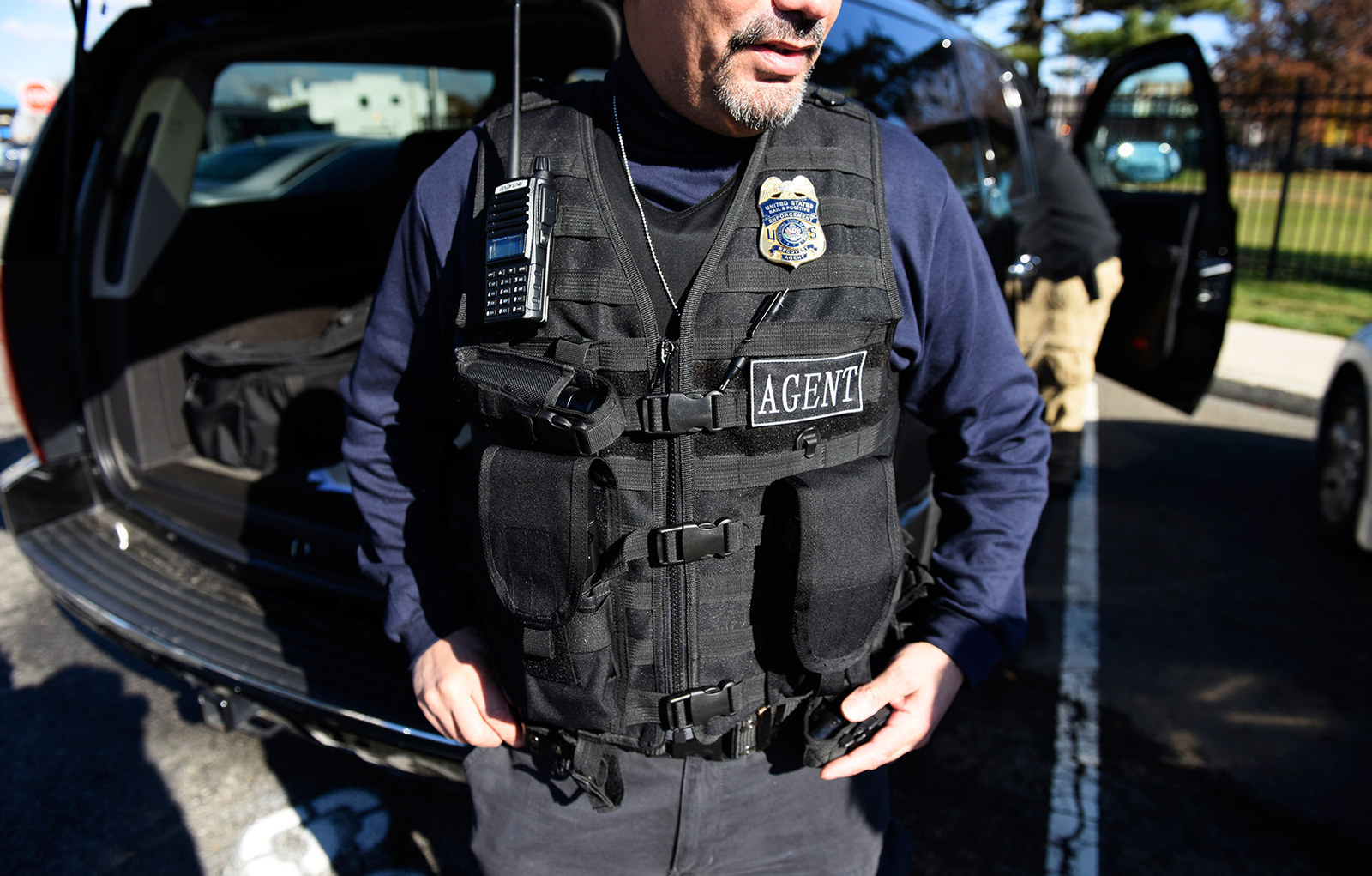
(Speaking over the phone from Istanbul, Sibel declined to comment. The many numbers registered under Montgomery’s name rang unanswered, and he did not respond to numerous emails sent to addresses associated with him.)
Esquenazi, who was by then a licensed bond agent, took over Carlin’s office in Long Island. She had a terrible credit score and no money, but convinced the landlord to lease the space to her. To match the size of her ambitions, she renamed the business Empire.
Twenty years later, she told BuzzFeed News, she makes “more money than [she] ever thought she would.” She declined to name an exact sum.
Save for a few minor glitches, Esquenazi’s record as a bail agent is clean. In March 2010, the New York Department of Financial Services fined her and her co-owners $3,750 for acting as bail agents “under the names of entities that were not licensed.” (Esquenazi told BuzzFeed News the fine was the result of a clerical error on the part of DFS.) In 2013, a woman named Emilia Rodriguez sued Empire in Manhattan civil court, alleging that the agency had failed to pay her back $75,000 in collateral. Empire settled the lawsuit, paying the woman her money plus $1,000.
“Invariably, when you are in the service business and are taking tremendous amounts of money, you are going to have people who are disgruntled,” Esquenazi said, cautioning that she didn’t remember the specific lawsuit. Rodriguez did not return several voicemails asking for comment.
Esquenazi’s good fortune is not lost on her, and she has a policy of hiring former clients whenever possible. Bail bonding, at least as Esquenazi conceives it, is also a privatized re-entry industry. It’s one of the few careers where a job applicant’s brushes with the law can prove an asset.
Take Samuel “Pa” Lapooles, whose unsmiling face, sometimes comically photoshopped on top of a Santa Claus outfit, adorns every Empire office. Lapooles met Esquenazi in 1995 when he was charged with felony assault of his daughter’s boyfriend. He worked at Empire until he died in 2008. His daughter, Ivy, is now Esquenazi’s right hand. Anton and JoJo, two of Esquenazi’s bodyguards, were also once her clients. At her office on a recent afternoon, a teenager with the word “SOLDIER” tattooed on his neck in Gothic script was making photocopies and fetching coffee.
“She gives people an opportunity,” said Ivy. “It’s up to you if you take it or not.”
Even critics of the industry recognize that bail agents are often deeply rooted in the communities they serve. “Marginalized communities often see bail agents as their friends, as people who bring them justice,” said the Vera Institute’s Wool. “The problem is that the system that allows bail bonding to exist hurts those same communities.”
The Empire office is a remarkably diverse place in terms of race, class, religion, and sexual orientation, but Esquenazi considers hiring a heterogenous group of people a financial imperative rather than a moral one. Simply put, business is better when her staff can see eye to eye with any possible client — whether it is a high schooler from Bellmore caught with 200 oxycodone pills or a Mexican immigrant in deportation proceedings.
“We need to make our clients feel comfortable,” she said.
Still, Esquenazi’s business depends on her ability to capture people who skip bail. For this purpose she contracts a bounty hunter whom everyone calls Hollywood because, as he put it, he “does shit you only see in the movies.”
To capture a fugitive, Hollywood, who asked that his real name not be used, for security reasons, charges Esquenazi a fee of between 5% and 25% of the total value of the bond. He and his team of six men are not allowed to carry guns, so they rely on unorthodox tactics.
They stalk targets on social media, creating fake accounts to trick them into revealing information. They routinely lie to defendants and their families, promising to arrange new court dates only to arrest them when their guard is down. Sometimes, Hollywood’s wife will seduce fugitives over the internet or by sexting them — all to trick them into telling her where they are.
“I’ll be lying in bed next to her and she’ll be making love to the other guy over the phone,” Hollywood said as he flipped through racy selfies that defendants have sent his wife. “And I’ll be like, damn, she never was that sweet to me.”
Recently, Esquenazi asked Hollywood and his men to find Ayanna Zellner, a woman from Freeport, Long Island, accused of driving her boyfriend's getaway car after he shot at several police officers. She was arrested in the summer of 2012 on 23 charges, including reckless endangerment, possession of a weapon, possession of stolen property, and fleeing a police officer. (Her boyfriend, Damon Banner, pleaded guilty to attempted murder of a police officer in exchange for a 16-year sentence.)
Zellner was not in jail because she had hired Empire Bail Bonds to put up $25,000. But on Sept. 16, she didn’t show up to a routine court hearing, ending the contract she had signed for her freedom.
Hollywood and his team got word that Zellner was staying with her mother. Then, at 4 a.m. on a freezing Sunday in November, Hollywood and his men assembled at a parking lot in Hempstead, Long Island, and set out to capture the wanted woman.
It was still dark when the bounty hunters got to the house — a two-story clapboard painted pale yellow that had seen better days. They had contacted the local police in advance, and the officers were already waiting for them. Hollywood and his team surrounded the building and began banging on every window and door. After a few minutes, Zellner’s mother appeared in a window on the top floor.
“You ain’t coming in unless you have a goddamn warrant!” she yelled. “I’m calling the police right now!”
“They’re already here!” Hollywood said, gesturing at the police officers behind him. “And I have a warrant, so open the fucking door!”
The mother refused. One of Hollywood’s men then kicked the heavy wooden back door open. It fell to the ground with a sound like a gunshot. The bounty hunters and the police rushed into house, holding cans of pepper spray.
Inside, the scene was ugly. Flashlight beams danced in the darkness. Screams and shrieks came from upstairs. Furniture crashed as the bounty hunters wrestled Zellner’s new boyfriend onto the floor. Zellner’s toddler and younger sister wailed, begging the bounty hunters not to take her away. The police officers stood away from the action, their faces somber and calm. A few feet away, Zellner’s mother paced the floor in her pajamas.
“I’m suing, I’m suing,” she went on repeating. “I want your names. You only do this shit to black people.”
(By at least some measures, Zellner’s mother was right: According to the Pretrial Justice Institute, bail offers for black defendants are on average 35% higher than those for white defendants.)
Hollywood’s team eventually found Zellner hiding in a closet upstairs. They dragged her out, dressed only in her nightclothes, and brought her downstairs. They sat her down in the living room as her mother and her child watched from the corner.
“Bring me some tights and some underwear,” she asked in a steely voice.
Zellner got dressed, trembling with rage and humiliation, surrounded by the dozen or so men who had just broken into her mother’s house. Upstairs, the wailing had become sobs. Someone, perhaps Zellner’s sister, kept mumbling, “No, no, no.”
The bounty hunters handcuffed Zellner and took her out of the house. She was calm and collected but clearly furious. She declined to comment to BuzzFeed News. Her attorney, public defender Michael Barnett, did not respond to several requests for an interview.
Hollywood handed the police a folder containing copies of Zellner’s bond agreement and of the warrant for her arrest. He then got in the car and drove her to Nassau County Jail, in East Meadow. Zellner has since been remanded, which means she will spend the rest of her trial behind bars.
In the prison parking lot, Hollywood triumphantly fist-bumped each of his men.
“Vayan con Dios,” he said to the team, and then he got in his car and drove away.
When asked whether it bothers her that her business depends on the kind of violence that took place during Zellner’s arrest, Esquenazi said she doesn’t “feel emotionally connected to the defendants.”
“But I do feel for the children and family members, for anyone who lives in a house with a wayward member that brings that kind of shame and disorder into the house,” she went on. “It’s not like we relish something like that, but at the end of the day we don’t have a choice.”
Esquenazi then recounted the myriad of choices that, in her view, Zellner had to make to find herself in handcuffs at 4 in the morning. She could have chosen not to steal the credit cards that the police allegedly found in her car. She didn’t have to flee the cops when they tried to arrest her. She could have opened the door to her house when Hollywood knocked.
“If that individual had gone to court, this wouldn’t have happened,” Esquenazi said. “She was given many opportunities to surrender like a lady.”
In Esquenazi’s world, there seems to be no space for structural causes, only for individual choices. As she sees it, she has pulled herself up by the bootstraps every day of her life, inching up in the world one street corner at a time, from East New York to Canarsie to Long Island.
The logic is contagious — her ex-convict staffers speak of their lives in terms of the seizing of opportunities, of redemption through decision. But they offer no compassion for those who may have been dealt a bad hand from the start. If they made it in America, the bond agents seem to reason, so can others.
As for herself, Esquenazi has made peace with her work. She genuinely sees herself as someone who provides justice.
“I take people’s liberty very seriously,” she said.
